- Home
- Iain Pears
The Immaculate Deception ja-7 Page 10
The Immaculate Deception ja-7 Read online
Page 10
"Not how Stonehouse tells it.”
"Finzi was a natural. Loved paintings—had a better eye than anyone I ever knew, for all that he was a businessman. Everything he ever bought was a gem. And a kind man, as well; he took me on to order his collection when I was a penniless student in Rome, and paid me a salary until I got my first job. And made me the chief beneficiary of his will. Except for the pictures that went to the National Gallery.”
Ah. Argyll thought. That's where it all came from.
"Stonehouse was loathsome; he never had to earn any money himself, so didn't know its value. Just its power. And he bought rubbish; any good paintings in his collection were there by accident. Did you ever hear the story about his Modigliani?”
"Vaguely," Argyll confessed. "It was destroyed, wasn't it?”
"Typical of the man. Too weak to do anything about his wife having an affair with him, but becomes outraged when he paints her in the nude. People might suspect, you see. Couldn't have that; nothing else mattered to him. It was all appearances with him.”
"This picture . . . ?”
"Finzi knew what it was by instinct; I could prove it after I'd worked on the matter a little. I had it all down, tracked down the preparatory sketches in the Uffizi, identified the print by Passarotti; but I never published. Couldn't; wouldn't as long as it was in the hands of that man. Stonehouse didn't have a clue; he relied on that old fraud Berenson, who gave him an invented attribution as a joke. Berenson knew perfectly well what it was, but would rather have died than tell him. Stonehouse never had a sense of humor and could certainly never tell when he was being made fun of. I took it on impulse when I saw where he'd hung it. That was the final insult. Had it been mine, I would have cleared out every other picture in the entire place, and just had that, hanging in the best position I could find. Not tucked away in some little bedroom surrounded by rubbish.”
Argyll now had a ticklish problem on his hands. He had the picture, or rather Bottando did; Bulovius had the identity. Joining the two together might be more difficult than it seemed. People often make the mistake of thinking that art dealing is all about art. It isn't; it is all about information, and the person who knows what a picture is generally is in a stronger position than the one who merely owns it. Bulovius knew this as well as Argyll did; better, in fact. It was so deeply ingrained in him that he would not disclose what he knew as a matter of honor unless he got something in return. It was Argyll's task now to prize the more important part of the equation out of his grasp.
"Let me get this straight, please," he said, ignoring the problem for the time being.
"You arrive at the villa, already knowing this picture was there and planning to take it
...”
"No, no," he said testily. "What do you think I am? I knew it was there, naturally.
Finzi had mentioned it on many occasions and I was looking forward to seeing it. I was in quite a tremor when I didn't notice it in any of the main rooms. Finzi never considered that Stone-house had kept it merely to prevent him from having it. If he'd loved it and couldn't bear to part with it, then he might have been forgiven.”
He stopped. Damnation, Jonathan thought. Another few words and he might have come out with the name.
"Anyway, when I finally spotted it, sandwiched between a hideous portrait and a print, I was horrified. And contemptuous. It was very naughty of me, but I decided to teach him a lesson. If he didn't know what it was, he wouldn't miss it.”
"So you took it.”
Bulovius heaved a sigh. "I did. And I must say I can quite see the appeal of a life of crime. It was terribly exciting, sneaking around in the middle of the night on tiptoe, hiding the picture. Although a bit nerve-racking. I was quite a-flutter by the end.”
"Where did you put it?”
"Oh, nowhere very sophisticated. I'm afraid I'm not so imaginative about that sort of thing. I might have done better had I thought a bit more, but I spent so much time screwing up my courage to take it, I didn't really think about what to do next. Stonehouse had a huge settee in the salon; ugly, but the only comfortable thing in the entire room. I put it under there. No one had cleaned under it for years; I almost woke the entire house with sneezing when I stuffed it under. It gave me a bit of a shock the next day when I saw that policeman sitting on it.”
"So how did it get into the ditch?”
"I don't know. All I know is that, after I removed it from Stone-house, someone removed it from me. And then I watched from my window as one of the policemen and that Verney woman strolled across the garden, straight to the ditch where it was found.
And found it.”
Argyll's recovery from the shock was impressive. Scarcely a blink. Not even a slight stammer, let alone anything more melodramatic, like an audible groan, or beating his breast and falling to the floor, even though, in his opinion, all would have been perfectly excusable. He should have known, of course, that Mary Verney would have been involved; how, exactly, still seemed hopelessly obscure to him.
"What Verney woman was this?" he asked with a lack of interest that made him feel rather proud.
"She was some sort of student. Pretty girl, though a bit pert for my taste. A bit too clever, if you understand me. And far too much in the company of the police for my liking. I only remember her because she knew a dealer friend of mine.”
"What do you mean, 'in the company of the police'?”
Bulovius chortled and gave Argyll a knowing wink, which was a remarkably repulsive sight on the ancient face.
"Too fond of them, if you see what I mean. She looked like a young innocent, but always seemed to know far more than she let on.”
Vague and unhelpful, but then Bulovius didn't really want to be helpful. "I see," Argyll said. "But this picture . . .”
"That's all I can tell you," he replied. "The policeman handed it over in triumph, much to the obvious irritation of his rather bumptious superior officer, and as far as I know the matter was dropped. The police came up with some theory that the thieves had panicked and dropped it as they fled. Complete nonsense, of course, and I'm sure that young man knew it as well. He was protecting me, it seemed, which was very agreeable of him, although I can't think why he did. Whatever, the police, Stonehouse, and I were all happy for the matter to be dropped, and dropped it was. End of story.”
He paused and sipped his whiskey with such obvious relish that Argyll was glad he'd let him have it. Once the complete thrill of pleasure had coursed around the old man's frail body, Argyll tried again to broach the real subject.
"Your identification. You're sure about it?”
"Of course. I know you think it is just my fancy; it isn't. Compare the one in Fiesole, look at the style, and above all, read your Vasari. There is no doubt about it at all; enough evidence to convince even the most skeptical. Overwhelming, once you put it all together. Many paintings are attributed on far less evidence. If Finzi could only have completed it ...”
Argyll was trembling with frustration. All he had to do was take the plunge. What in God's name is it? He had to ask quietly, although he felt like screaming. But he knew what would happen. Bulovius would clam up. In fact, the faintest twinkle in the old rogue's eye suggested he knew perfectly well what was going on. He might eventually cough up, but not until Argyll worked for it.
He pushed and probed for a while longer, but then gave up for fear of making the old man dig in his heels. Then he left as graciously as possible, and stumped cursing down the stairs. He went to Bottando's apartment, and leaned on the bell for longer than was necessary in the hope that Bottando had returned and could let him in so he could study the picture again. But no luck. The general was still away, and an inch of wood reinforced with steel plate prevented him from getting in.
He went to bed no wiser; and when he decided to take the chance the next day and ask Bulovius a straight question, he was met at the door by the old man's nurse.
Tancred Bulovius, she said in a sorrowful voice, had died in the
night, probably because the old soak had somehow managed to get hold of some whiskey.
12
For Flavia, the first indication of trouble came around about the same time that Argyll was listening with mounting discomfort to the nurse's tale of Bulovius's last moments. It was two o'clock in the afternoon, and the loathsome journalist had rung back.
"I was wondering," he began, "if I might have your comments on a story we're thinking of printing.”
"Go ahead," Flavia said. "If I can, I will.”
"It is about the theft and ransom of a painting from the National Museum.”
Flavia's heart took a little leap downward; her stomach flipped over.
"Do tell," she said. "It's the first I've heard of it.”
"Really?" Dossoni sounded unconvinced. "We have it on good authority that a painting to be shown in the forthcoming exhibition of European art was hijacked by a band of armed robbers, who escaped despite the heroic efforts of guards to stop them
...”
"What did the guards do?”
"Apparently, our sources say they hurled themselves on one robber, and only stopped resisting when the thieves threatened to shoot one of them.”
"Very courageous of them," Flavia said.
"The painting disappeared, then reappeared a week later. A ransom had obviously been paid.”
"Obviously. If any of this is true. What does the museum say?”
"I haven't talked to them yet.”
"Your source for this is one of the heroic guards, I assume?”
"I couldn't possibly tell you that. Can you confirm the story?”
"No. In fact, I can deny all knowledge of it.”
"There was no theft?”
"Don't be ridiculous. How long could you keep that quiet?”
"No ransom paid?”
"Not by me. You asked me this a week ago, if you remember. I told you then that it was illegal, and that we don't have access to money like that. How much were these guards paid?”
"We never pay for stories," he said. "We don't have much money either. But I was told the guards were hauled up in front of you and told to keep their mouths shut.”
"Didn't do a very good job, then, did I?”
"No. Nor did you answer my question. Did an armed gang steal a painting from the museum last week?”
"Absolutely not.”
"Did you pay a ransom to get it back?”
"Absolutely not. There was no armed gang stealing anything from the museum last week. Or the week before.”
"Any other comments?”
"Yes. Never trust the word of guards. Heroic or otherwise.”
She put the phone down and frowned, murderous thoughts on her mind. It was only a matter of time before Dossoni amended his questions and got the story right. She wasn't responsible for it, but she sensed stormy waters ahead. In the circumstances, she thought it a good idea to forewarn the prime minister. And to shout at Macchioli for his inability to control his staff.
Then she went home and found a disconsolate Argyll, who promptly confessed to her that he was, to all intents and purposes, a murderer.
"I gave him the whiskey. For heaven's sake! How could I have been so stupid?”
She was not sympathetic.
"I feel terrible about it," he went on.
"Because you killed him or because he didn't tell you what that picture is," she asked dryly.
"Mainly the first. But the second doesn't help. What do you think about Bottando? His knowing Mary Verney. He never mentioned it the last time when you wanted to arrest her, did he?”
"No. But it may be that he didn't make the connection. After all, it doesn't seem as though she was suspected of anything back in 1962. She was never questioned, or anything. Just a witness. And I can't remember the names of witnesses I talked to forty days ago, let alone forty years.”
"Hmph." Argyll was unconvinced. Anything and everything to do with Mary Verney made him quiver a little. Her mere existence, in his opinion, was a nightmare. He had not yet forgiven her for the fact that she was so very good at seeming a sweet, harmless, and slightly eccentric lady of a certain age, most concerned with blackfly on roses and the current state of the village church restoration appeal. As a result, he tended to overestimate her capacity to cause him grief. If the angel of the lord came down to blow a mighty trump and announce the end of the world, Argyll would easily have believed Mary Verney was, somehow, responsible for the event for obscure reasons of her own. And his opinion of her was high enough to think that even at a distance of nearly forty years, her deeds could cause mayhem.
"The trouble is that she was there. Now Bulovius's dead, she's my only hope.
Bottando at least seems genuinely to have no notion that the picture was anything in particular.”
"Which it might not be.”
"True." He thought, then shook off the feeling of glum foreboding that had descended on him ever since he heard of Mary's presence at the Villa Buonaterra in 1962. "Go on, then. What's on your mind?”
"Nothing of importance in comparison to you," she replied, with a mild hint of acid in her voice. "Just journalists and paintings and ransoms. I'm beginning to feel vulnerable.”
Argyll nodded when she had summarized her day. "You might have mentioned it before I went rabbitting on, you know," he said reproachfully. "What are you going to do about it?”
She shrugged. "Nothing. What can I do? Either the paper publishes its story, or it doesn't. I've done my best, and can at least point to the fact that I did say it was inevitable. Smash and grab raids on museums are hard to keep quiet forever. However, that doesn't mean I won't take the blame.”
"What for?”
"They'll think of something. Allowing the robbery to happen. Paying a ransom against the express orders of the prime minister. Failing to keep those stupid guards quiet. Not arresting the robber while he was still alive. Something like that. Or maybe nothing.
Maybe they'll just ease me out; there are plenty of people who want my job, after all.
This gives them a perfect opportunity.”
She stood up and stretched. "And there really is nothing I can do. Except try and find the money. In which case I might be able to count on Di Lanna to put in a good word.
Or, then again, maybe not. He seems to want the whole thing dropped as well.”
"Sounds like good advice to me.”
"You won't say that when this Dossoni character runs his story.”
"You don't seem too concerned.”
"I'm not, oddly enough. I don't know why. Maybe it's Bottando's going. He was always the great inspiration. Dedication, you know. I worked for him more than the department. Even when he went, I always thought he was still in charge really.”
"So he was, in theory.”
"But he packed his bags and walked away, without a moment's regret, it seems. And if he can do it after so many years, why am I so enthusiastic? What does it matter, anyway, running round chasing after pictures?”
"Not a positive attitude.”
"No. But there must be something more worthwhile to do.”
"What?”
She thought. "I don't know.”
She nibbled at a piece of cheese, then sat down again. "Meanwhile, I'll fill in the hours by going to Siena tomorrow. Records has produced the address of an old comrade-in-arms of Sabbatini. It's probably a waste of time, but you never know.”
13
The drive to Siena was uneventful, even pleasant. It is very hard to be preoccupied and worried when you have the distractions of Italian traffic constantly threatening to force you off the road if your attention wanders too much. The address she had was for a small village about twenty kilometers to the northeast, but she stopped in the town anyway to have some lunch and also to look at the language school where Elena Fortini, Sabbatini's former colleague, now worked. Her file said she was half American and half Italian and spoke English fluently. This skill now gained her a living, and a very quiet living it must
be, Flavia thought to herself. Anybody who buried herself here must be looking for a quiet life.
This woman had been an artist of a sort back in the 1970s as well, although then she had produced the sort of art which rarely engaged Flavia's official attention. She had been an ideological soul mate for Sabbatini and reading between the lines of the file Corrado had found for her, Flavia guessed that she had been the brains behind his politics. While she sensed that Sabbatini had been a radical because it was fashionable, this woman had been more serious, her opinions and actions more carefully thought through, even reasonable. Sabbatini had followed her lead and acted as he did to draw attention to himself.
As with many of the people who had been in revolutionary movements in the 1970s, Elena had realized, perhaps earlier than most, that the battle would never be won.
Consequently, she had taken up an offer of a pardon in return for a brief prison sentence, a full confession, and information about her erstwhile colleagues. A notice attached to the file expressed irritation that the amount of information she gave was minimal, and completely unhelpful. Even when saving her own skin, she was unprepared to give up her friends.
Finding her had been remarkably easy; once a political criminal, always a political criminal, and Fortini was required to register her address every six months even though it hadn't changed for years. The latest address was attached to another file Flavia had extracted from colleagues in antiterrorism.
Once she had eaten, rested, and prepared herself she drove the rest of the trip to where the woman lived. The house was a small and run-down pile, one of those difficult structures that is clearly old but could have been built anywhere between the fifteenth and the eighteenth centuries. Not big, but with bits added on here and there, so that the roofscape of terra-cotta tiles headed up and down in all directions and at all angles.
Valuable now that so many English and Germans and Dutch wanted summer houses; bought for a song ten or twenty years ago and now worth a fortune.
All the stereotypes that built up in her mind so easily began to break down as Flavia walked to the door and saw the piles of chicken feed stacked neatly on the little terrace, the washing line covered in children's clothes, and as she took in the general air of impoverishment—a tile missing here, a large crack in the thick stone wall there—that hung about the place. Not neglect, though; everything had a well-loved air to it.

 The Dream of Scipio
The Dream of Scipio Stone's Fall
Stone's Fall The Last Judgement
The Last Judgement An Instance of the Fingerpost
An Instance of the Fingerpost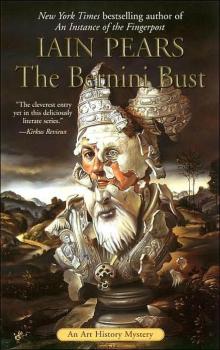 The Bernini Bust
The Bernini Bust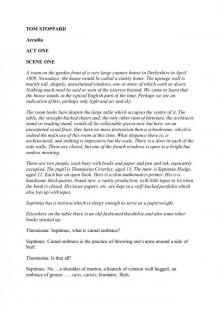 Arcadia
Arcadia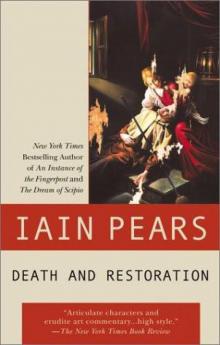 Death and Restoration
Death and Restoration The Raphael Affair
The Raphael Affair The Titian Committee
The Titian Committee The Immaculate Deception
The Immaculate Deception Giotto's hand
Giotto's hand The Portrait
The Portrait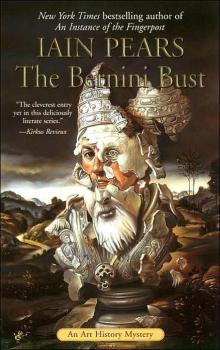 The Bernini Bust ja-3
The Bernini Bust ja-3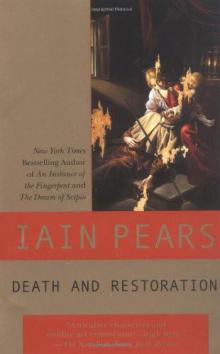 Death & Restoration ja-6
Death & Restoration ja-6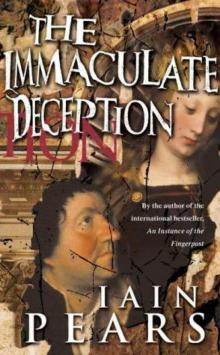 The Immaculate Deception ja-7
The Immaculate Deception ja-7